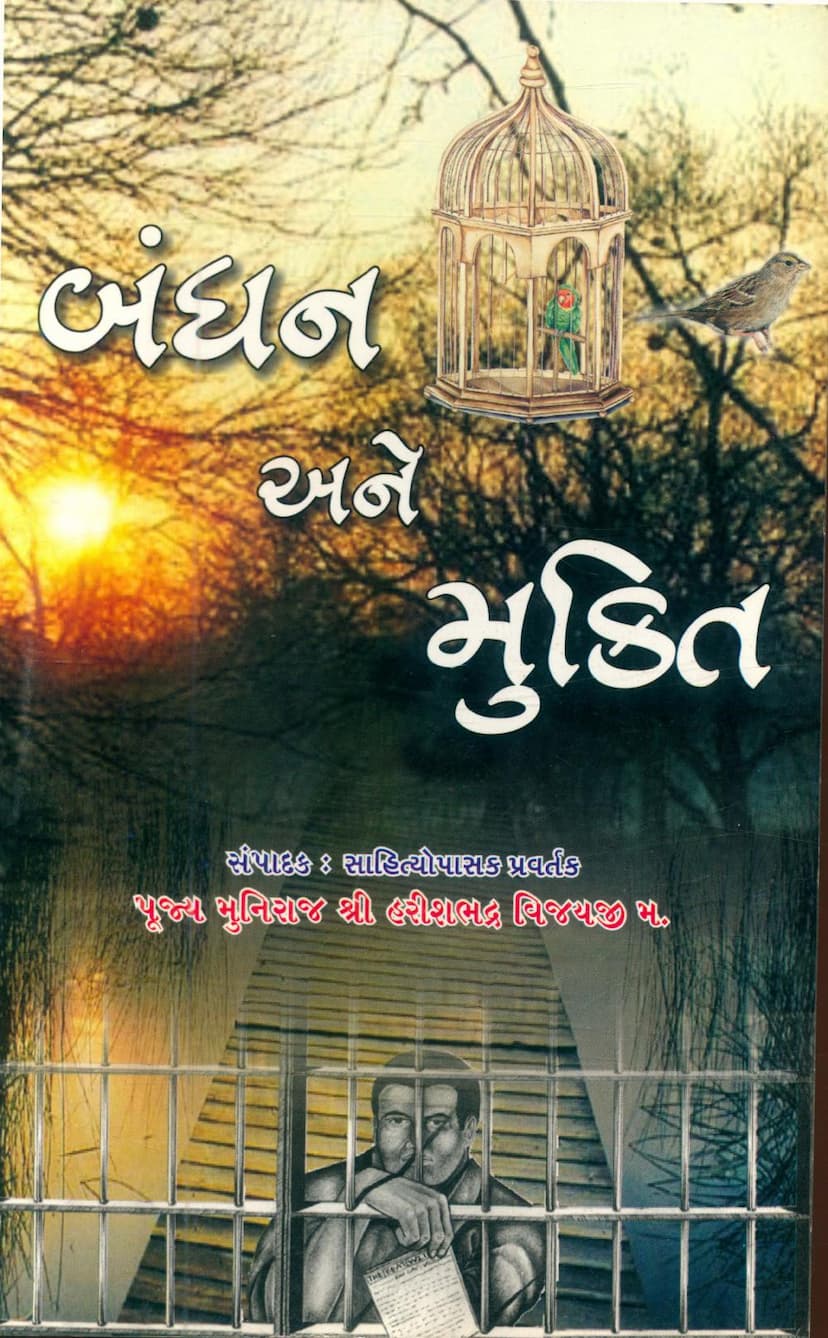Bandhan Ane Mukti
Added to library: September 1, 2025

Summary
This is a comprehensive summary of the Jain text "Bandhan Ane Mukti" (Bondage and Liberation) by Harishbhadravijay, published by Navjivan Granthmala. The book serves as a textbook for the "Tatva Bodh Pariksha-20" (Knowledge of Principles Examination-20).
Core Theme:
The central theme of the book is to explain the Jain concept of bondage (Bandhan) and liberation (Mukti) from the cycle of birth and death, achieved through understanding and practicing Jain principles, primarily focusing on the role of Karma.
Key Concepts and Structure:
The book is structured as a guide for an open-book examination, aiming to educate readers on fundamental Jain philosophy. It systematically breaks down complex concepts into understandable sections, often using analogies and illustrative stories.
Key Sections and Their Content:
The book delves into the nature of existence from a Jain perspective, explaining how souls become bound and how they can achieve liberation. Here's a breakdown of the major themes covered:
-
Karma (Work/Deeds):
- Definition and Scope: The book starts by defining Karma as more than just action, but the consequences that bind the soul. It emphasizes that Karma influences every aspect of life across all beings and realms.
- Types of Karma: It details the eight types of Karma according to Jain scriptures:
- Ghati Karma (Destructive Karma): These are the primary obstacles to liberation, directly affecting the soul's innate qualities.
- Jnana-avaraniya Karma (Knowledge-obscuring): Obscures infinite knowledge.
- Darshana-avaraniya Karma (Perception-obscuring): Obscures infinite perception.
- Mohaniya Karma (Delusion-causing): Causes attachment, aversion, and delusion, leading to the cycle of rebirth. This is highlighted as the most significant obstacle, often referred to as the "king" of karmas.
- Antaraya Karma (Obstruction Karma): Obstructs the soul's inherent strength and the ability to perform good deeds.
- Aghati Karma (Non-destructive Karma): These do not directly affect the soul's intrinsic qualities but manifest as the physical body and its experiences.
- Vedaniya Karma (Feeling Karma): Causes experiences of pleasure and pain.
- Ayushya Karma (Lifespan Karma): Determines the duration of life and the realm of rebirth.
- Nama Karma (Name Karma): Influences the physical form, qualities, and characteristics of a being.
- Gotra Karma (Status Karma): Determines social status, lineage, and family reputation.
- Ghati Karma (Destructive Karma): These are the primary obstacles to liberation, directly affecting the soul's innate qualities.
- Bondage of Karma: The book explains how Karma binds the soul through various means like attachment, aversion, passions (kashayas), and ignorance (mithyatva). It details the process of Karma binding, including the causes (hetu), methods, types, and stages of bondage.
- Release from Karma: The path to liberation involves understanding and eradicating Karma through:
- Samyak Darshan (Right Perception): Correct understanding of reality.
- Samyak Gyan (Right Knowledge): Accurate knowledge of principles.
- Samyak Charitra (Right Conduct): Ethical behavior and discipline.
- Tapa (Asceticism/Penance): Austerities to burn off existing Karma.
- Samyak (Equanimity/Balance): Maintaining a balanced state of mind in all situations.
- Aparigraha (Non-possession): Detachment from material possessions.
- Brahmacharya (Celibacy/Right Conduct): Control over senses and passions.
- Samiti and Gupti: Practicing vigilance in actions, speech, and thought.
-
The Nature of the Soul (Atma): The book emphasizes that the soul is inherently pure, blissful, and omniscient. Bondage occurs when Karmic particles obscure these qualities. Liberation is the process of removing these obscuring karmas to reveal the soul's true nature.
-
The Path to Liberation (Mukti): The book outlines the spiritual journey:
- Understanding Bondage: Recognizing the causes of worldly suffering and the cycle of birth and death, primarily driven by Karma.
- Renunciation and Detachment: Developing a sense of detachment from worldly pleasures and possessions.
- Ethical Living: Adhering to Jain ethical principles like Ahimsa (non-violence), Satya (truthfulness), Asteya (non-stealing), Brahmacharya (celibacy), and Aparigraha (non-possession).
- Spiritual Practices: Engaging in meditation (Dhyana), contemplation, study of scriptures, and austerities (Tapa).
- The Role of Knowledge and Conduct: Highlighting that true liberation is achieved through the combined practice of right knowledge, right perception, and right conduct (Ratna Trayi - the Three Jewels).
-
Specific Karmic Manifestations: The book details how each type of Karma affects an individual's life, including physical characteristics (Nama Karma), lifespan (Ayushya Karma), experiences of happiness and sorrow (Vedaniya Karma), social status (Gotra Karma), and the obscuration of spiritual potential (Ghati Karmas). It provides examples from Jain history and scriptures to illustrate these points.
-
The Importance of Mind (Man-Mandir): The book stresses the critical role of the mind in both bondage and liberation. A controlled and pure mind, free from passions like anger, pride, deceit, and greed, is essential for spiritual progress. Meditation and mindful living are presented as key practices to achieve this.
-
The Examination Structure: The book includes specific instructions and guidelines for the "Tatva Bodh Pariksha-20," including examination dates, centers, eligibility criteria, and prize information, indicating its practical application as an educational tool.
Overall Message:
"Bandhan Ane Mukti" serves as a foundational text for understanding the profound Jain philosophy of Karma and its role in the soul's journey. It aims to equip individuals with the knowledge and motivation to break free from the cycle of suffering and attain eternal bliss (Moksha) through ethical living, spiritual discipline, and the eradication of karmic impurities. The book is presented in an accessible manner, making it suitable for both students and general readers interested in Jainism.